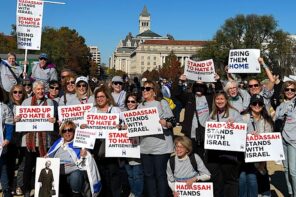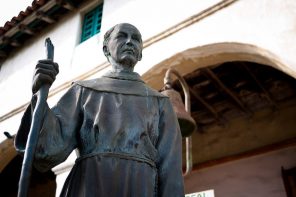When Sarah Palin said that America was carrying out God’s will in Iraq, the Alaskan governor caused a stir. What was the problem, exactly? What, precisely, was so upsetting? On the surface, nothing new was being said here. Like many of the country’s Christians, Palin was simply justifying the war on religious grounds, seeing it as consistent with revelation.
Besides, Americans have grown accustomed to hearing their politicians spout religious rhetoric. Who better to issue the standard ‘forces of light’ fare than a right-winger running for the country’s second-highest political office? Was it because this time, the person making the comment was a self-described ‘hockey mom’, and not a middle-aged man in a Brooks Brothers suit hectoring the country as though America was his congregation, and he, its Imam-in-Chief?
No, none of the above. What was so frightening about Palin’s words was what they did not say. That they were reminders of a way of talking about the war in the Middle East, and of framing its ideological meaning, that had somehow been elided by the Bush administration in the years that followed the 2003 invasion of Iraq. And that, after nearly an entire term of insisting that the war was about spreading democracy in the Middle East, fighting Al-Qaeda, and eliminating weapons of mass destruction, Palin’s language suggested we were now returning to using rhetoric describing the war as a conflict over values, a religious war.
To many Americans, it sounded like the clock had been turned back to September 2001, when Bush chose Washington’s National Cathedral as the best place from which to address the nation, and to argue that God was still with America, despite the tragedy He had allowed the country to undergo.
If that’s not enough to upset liberals, it’s hard to imagine what would. Especially if you consider the hope for progress engendered by Barack Obama’s surprising candidacy. After one of the most reactionary, religious presidencies in American history, we’ve had, for the last twelve months, a mixed race Senator from Illinois, with roots in Kenya, and bearing an Arabic middle name, became the front-runner in a campaign to take over the US presidency. Nothing could augur a more dramatic shift, culturally as well as ideologically, than this.
Though a religious Christian, Obama is, in the eyes of many Americans, the opposite of Palin. Reason instead of revelation, democracy, not theocracy, education instead of provinciality. You name it, Obama = progress. After eight years, to see the light at the end of the tunnel, and then encounter yet another fundamentalist pretender so close to the throne was the stuff of nightmares.
But perhaps there is something to learn here about American culture. Take, for example, the idea that the War on Terror might be consonant with revelation, or viewed, to speak theologically, as an expression of God’s mind in the world. From a secular perspective, such talk seems archaic. Though it may be one thing to view the conflict from the perspective of religion, to see the war as the product of God’s wishes is quite another. Yet, for many Americans, their religious commitments specify just such an approach, not just because they are religious, but because they are adhering to a particular notion, that of America as a “light unto the nations.” Americans have a tradition of emphasizing their country’s divine mission to the rest of the world.
It used to be that Americans emphasized their country’s global mission in colonialist terms. Manifest destiny specified America’s God-given right to expand its territorial holdings from the Atlantic to the Pacific during the 19th century. The idea that America was entrusted with the responsibility of bringing democracy to the rest of the world eventually distinguished American from European imperialism, endowing it with a liberal utopian hue lacking from its more cynical European counterparts. But Americans were inspired in their mission to spread democratic freedom by religion.
Indeed, it is the historic interplay between religion and the promulgation of democracy in American imperialist rhetoric that makes statements Sarah Palin’s so interesting. During the Cold War, US leaders frequently decried the godlessness of communism, yet always did so while arguing on behalf of the superiority of democracy over totalitarianism. Confessional freedoms were rhetorically significant, but only insofar as they demonstrated the kinds of superior individual freedoms permitted under democratic political arrangements.
Though Western intelligence agencies such as the CIA frequently funded Protestant missionary activities in regions such as Latin America, (not to mention supported Islamic revolutionaries in Afghanistan), these activities were not defined in terms of being expressions of God’s will. One was a sign or symptom of the other, even if, as was almost always the case, the Americans had no interest in promoting any kind of freedoms at all.
In Palin’s case, what we have is a break from this rhetoric altogether. In relation to the war in Iraq, all she did was explain what it means to her as a Christian, and why she thinks the conflict is theologically justified. That’s what is most frightening about her statement: It is not just that she is provincial, but that she doesn’t pretend that the war in Iraq is about anything else except what she thinks God wants.
What God really means in this instance (could it mean the state, or society, as Durkheim would interpret it?) is what’s subject to debate. Palin does not even pay lip service to political democracy. Indeed, her statement might be seen as reflecting a lack of concern for democracy in American Evangelical circles: God’s desire, and its actualization within our lives (and, apparently, those of Iraqis) is what’s most important. Everything else is secondary, if it matters, at all.
An analogy is in order here. During the Second Lebanon War, Syrian President Bashar al-Assad said that every generation of Arabs learns to hate Israel more. In the American case, one might argue that with every US Presidency, Americans become more religious.
What Americans hear in the utterances of young Protestant politicians like Sarah Palin is how far the re-enchantment of American politics has progressed. At the end of the Bush era, what we’re beginning to bear witness to is a language, and a politics, so thoroughly devoid of liberalism that it can somehow sanction the brutality and the destructiveness created by American foreign policy in the Middle East.
If that’s the case, its not a far jump to the “Second Holocaust” that Sarah Palin and John McCain have warned will transpire if Iran is allowed to develop nuclear weapons.




